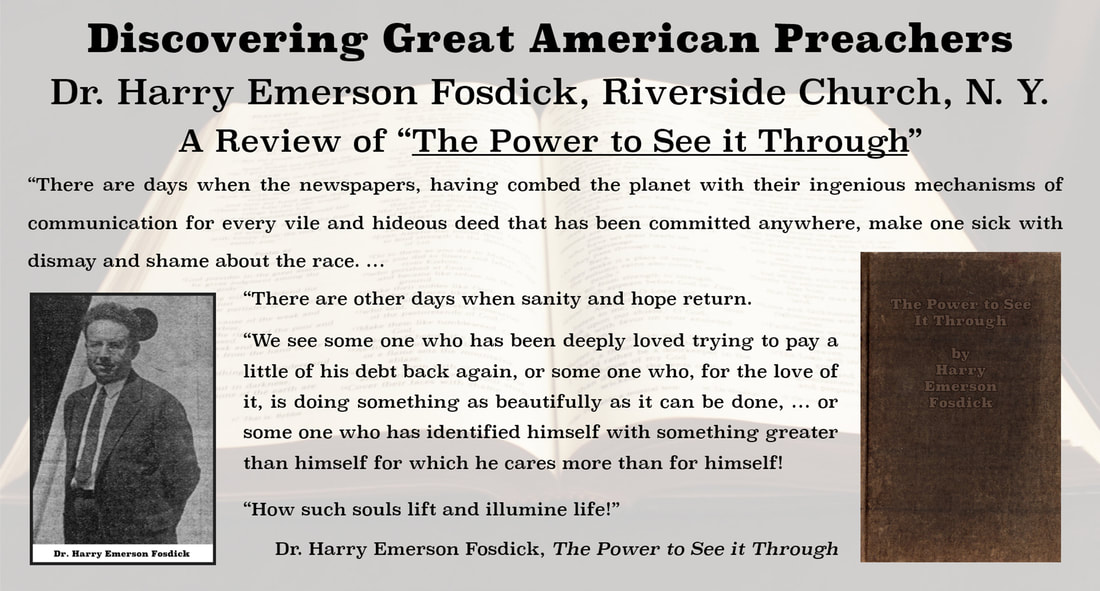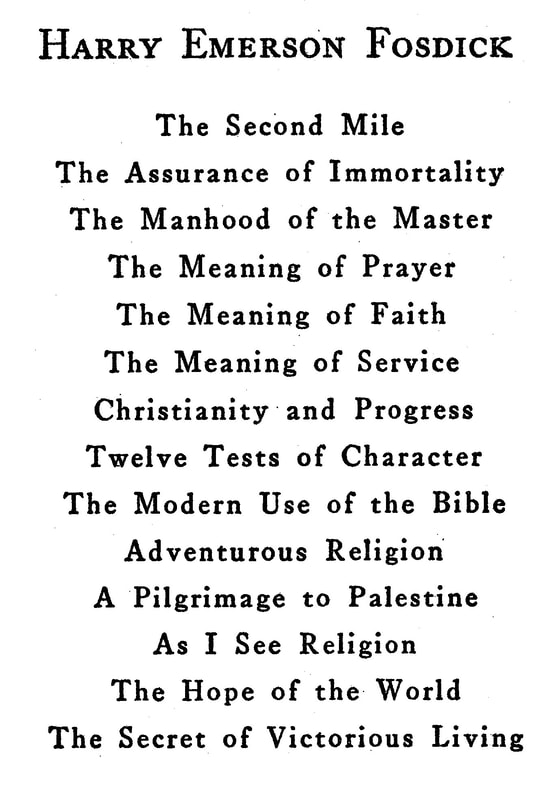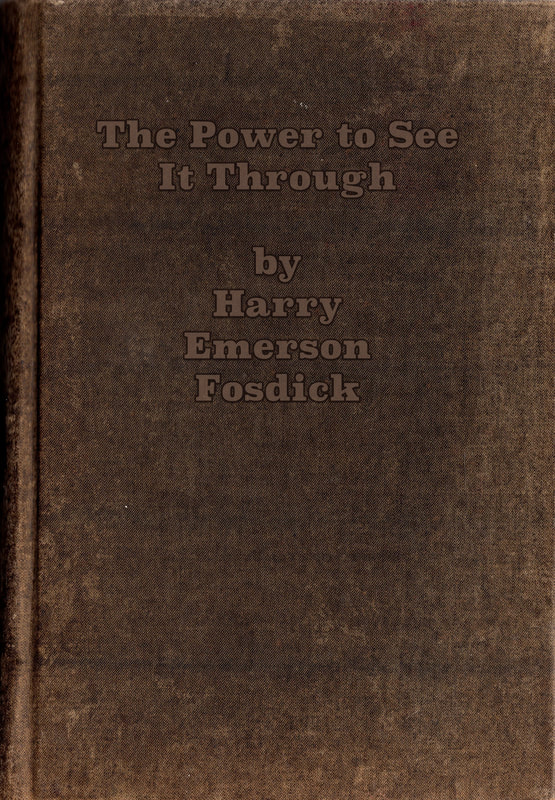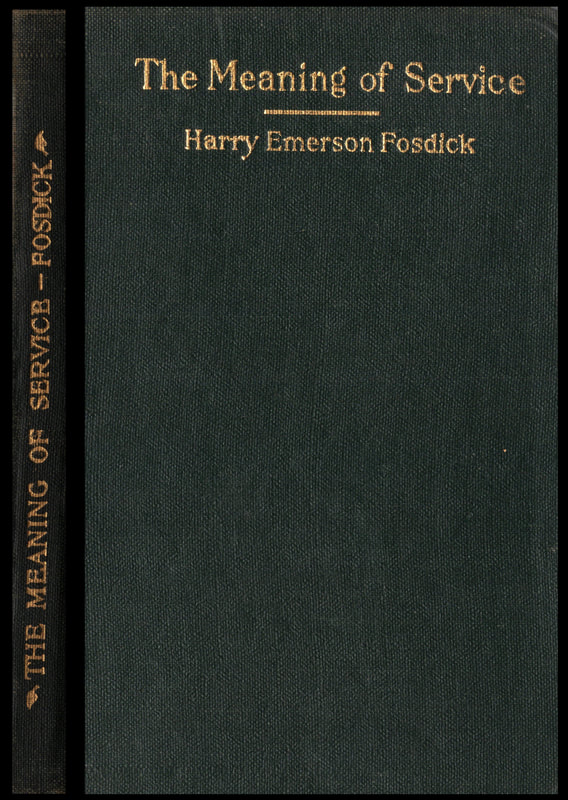A Review of Rev. Fosdick's "The Power to See It Through"
|
|
Date Published: June 28, 2023
Date Modified: January 1, 2024 |
“Harry Emerson Fosdick’s approach is psychological rather than theological. Three outstanding characteristics of the author are shown: tolerance, intellectual candor, and ardent feeling. It is direct in its appeal, simple in style, yet speaking in singing sentences and epigrams that flash like lightning.”
Book Review, The Moniteau County Herald, 1936
A Review of "The Power to See It Through" by Dr. Harry Emerson Fosdick
- Reviews of the Day: 1935–36
- Insights from "The Power to See It Through"
- This Author’s Thoughts and Perceptions
Reviews of the Day: 1935–36
This book of Dr. Harry Emerson Fosdick was one of many. From the list to the right, there were at least fifteen books published before this one—some of which were mentioned in these reviews of “The Power to See It Through.”
|
“A volume containing twenty-five sermons by Dr. Fosdick. The questions that have furnished the themes of these sermons are touching the hearts and minds of many people both inside and outside the churches. …
“Dr. Fosdick attacks these problems vigorously and sympathetically.” The Windsor Daily Star, Windsor, Ontario, December 14, 1935
“Sermons by one of the most brilliant of living preachers. Their effect is immensely heightened by their informality and simplicity of style. … They deal directly with questions that many individuals put to themselves, even if they do not ask them of others.”
The Cedar Rapids Gazette, March 8, 1936
“Sermons which have not only inspired thousands in the Riverside Church of New York but through broadcasting have become nationwide in their influence. The spirited courage, brilliant insight, and vigorous eloquence with which Dr. Fosdick attacks contemporary problems of life and religion are reflected on every page of this volume.”
|
Dr. Fosdick was a well-known author/speaker on topics that reached beyond the religious into the spiritual.
|
The Great Falls Tribune, May 24, 1936
So many times we seem to think that the problems each generation faces are new, unusual, and completely unique to them. Surely the circumstances and the economic, political, and spiritual settings are different, but might the human traits needed to overcome the differing issues still be the same: integrity of character, staying power, determination, compassion, knowledge, wisdom, and a sense of service?
This book, with its insights into human nature, captures the many “external problems” that were different—in the particulars, decades ago, but it also documents the same “internal characteristics” necessary to solve problems … then and now. This is helpful to remember when so many today are trying to monetize articles on generalizations about generations. They are attempting to profit by highlighting generational conflict. It is good to be reminded of solutions from decades past that proved themselves successful and might still be as applicable today as then.
Read, ponder, digest, churn over the following insights and come to your own conclusions.
This book, with its insights into human nature, captures the many “external problems” that were different—in the particulars, decades ago, but it also documents the same “internal characteristics” necessary to solve problems … then and now. This is helpful to remember when so many today are trying to monetize articles on generalizations about generations. They are attempting to profit by highlighting generational conflict. It is good to be reminded of solutions from decades past that proved themselves successful and might still be as applicable today as then.
Read, ponder, digest, churn over the following insights and come to your own conclusions.
Insights from "The Power to See It Through"
|
Choosing a representative set of quotes from this book was one of the most difficult tasks I have had in all the reviews I have ever written—mainly because each article was like an intricate web spun by Dr. Fosdick. At first, he sets a stabilizing structure of concrete thoughts and then interconnects these ideas with supporting stories and insights that pull the entire structure together into a single idea with a multitude of insightful branches.
I found it impossible to find a summary line or two within most articles that seemed to do the entire presentation the justice that it deserved. With that, here are a few insights from the book. |
- “The Power to See It Through:” On Starting Power vs. Staying Power
"However beautiful one’s beginning, nothing matters much in human life without a good end.
“One does not mean that we may demand an outwardly successful and fortunate conclusion, as in old sentimental novels where everything had to come out happily ever after. But without a good end, without morale and staying power and steady character to see a man through to a worthy conclusion, what else in life can be much worthwhile? …
“Therefore, let us not talk together about starting power—every soul here has more than once made a fine beginning—but about staying power. I celebrate the qualities of faith and character that enable a man to see life through. For one thing, staying power is always associated with a certain central integrity of conscience.
“Whatever else life may give or may deny, one thing is absolutely indispensable—that a man should not break faith with himself, that he should keep his honor bright in his own eyes, that whatever else may fail he should not inwardly be a failure.
“Such quality of conscience that, whatever happens, a man lives on high terms with himself, is the essence of staying power.”
“One does not mean that we may demand an outwardly successful and fortunate conclusion, as in old sentimental novels where everything had to come out happily ever after. But without a good end, without morale and staying power and steady character to see a man through to a worthy conclusion, what else in life can be much worthwhile? …
“Therefore, let us not talk together about starting power—every soul here has more than once made a fine beginning—but about staying power. I celebrate the qualities of faith and character that enable a man to see life through. For one thing, staying power is always associated with a certain central integrity of conscience.
“Whatever else life may give or may deny, one thing is absolutely indispensable—that a man should not break faith with himself, that he should keep his honor bright in his own eyes, that whatever else may fail he should not inwardly be a failure.
“Such quality of conscience that, whatever happens, a man lives on high terms with himself, is the essence of staying power.”
- “The High Uses of Serenity:”
“This basic law holds good: nothing great without serenity.
“Let us get our eye clearly, then, on what we are talking of—not serenity as an escape from life, but as an indispensable part of life: what rest is to the body, what peace is to the home, what roots are to the tree, what depth is to an ocean.
"Nothing in heaven above or the earth beneath can be great without serenity! …
“There are people who are trying to substitute thrills for serenity. Having no serenity at home within themselves, they run away into sensations, spend as much time as possible away from themselves amid their thrills, and then at last have to come back again to no serenity.
“That is the very essence of unhappiness.”
“Let us get our eye clearly, then, on what we are talking of—not serenity as an escape from life, but as an indispensable part of life: what rest is to the body, what peace is to the home, what roots are to the tree, what depth is to an ocean.
"Nothing in heaven above or the earth beneath can be great without serenity! …
“There are people who are trying to substitute thrills for serenity. Having no serenity at home within themselves, they run away into sensations, spend as much time as possible away from themselves amid their thrills, and then at last have to come back again to no serenity.
“That is the very essence of unhappiness.”
- “What Is Religion Doing to Our Characters?”
“The will of God for the world—and for our lives within it, does not consent to any deplorable status quo but involves disturbing, forward-looking ideas which require strong vision to see, faith to believe, and courage to stand for. … God’s will, when it is truly known, produces no egoism. …
“It carries men out of themselves, makes them forget themselves; it rebukes and chastens, humbles and dedicates them.”
“It carries men out of themselves, makes them forget themselves; it rebukes and chastens, humbles and dedicates them.”
- “On Shouldering One’s Own Responsibility”
“The thoughtful areas of young people with whom I deal, especially in the seminary and the university, are commonly divided into two groups: first, partisans of individual faith and character; second, partisans of social reform. The first say that we must get good people to achieve a good society and the second say that we must get a good society in order to achieve good people. They both are correct. … This tunnel must be dug from both ends. We need good people to make a good society and we need a good society to make good people. …
“Some young people are fooling themselves; I think. They find it easier to become excited over social reform than to deal intensively with their own characters. They are making a general interest in world problems a substitute for a resolute grappling with their own inward needs.”
“Some young people are fooling themselves; I think. They find it easier to become excited over social reform than to deal intensively with their own characters. They are making a general interest in world problems a substitute for a resolute grappling with their own inward needs.”
This Author’s Thoughts and Perceptions
|
In this book, I would highly recommend the following chapters as starting points: The High Uses of Serenity; Every Man’s Religion His Own; The Ideas that Use Us; What Is Our Religion Doing to Our Characters; Family Religion; and On Shouldering One’s Own Responsibility.”
Since each chapter is a sermon or radio address, this is a book that can be read one chapter at a time. It is a wonderful “nightstand reader” that will motivate a person to better understand the spiritual side of Christianity in particular or what the true purpose of any religion in general should be. Dr. Fosdick’s essay on “What Is Our Religion Doing to Our Characters?” really hit home for me in this area. The following observation I find all too accurate about those who are so religious that they sometimes exclude the spiritual from their lives: |
“Meanness in other realms [non-religious] has at least a fair chance to be recognized as such, but religion can sanctify [purify] meanness, make little things holy until strong, deep loyalties adhere to them. … The consequence is that, both in individuals and in whole generations, religion, far from promoting good character, can supply and has supplied substitutes for good character. … As Christ said: 'Woe unto you, scribes and Pharisees, hypocrites! for ye tithe mint and anise and cumin, and have left undone the weightier matters of the law: justice, mercy, and faith.' ”
It is definitely a book with sermons composed for a Christian audience, but as one of the reviewers above notes, Dr. Fosdick’s approach was “psychological rather than theological” reflecting the outstanding characteristics of “tolerance, intellectual candor, and ardent feeling.” These sermons are rooted in the Christian faith and Christ’s teachings but reach way beyond that focus in their appeal. In fact, the words above from Dr. Foster’s sermon on “Religion and Character” were delivered at the American College at Beirut, Syria where “sixteen different religions” were represented.
I will close out with this thought of Dr. Fosdick’s from a sermon on “The Mainsprings of Human Motive.” Since Dr. Fosdick worked alongside Thomas J. Watson Sr. on some pretty amazing projects, Tom Watson was one of the “better businessmen” that he refers to in this rather refreshing outlook on those in the business world with which he came into contact:
I will close out with this thought of Dr. Fosdick’s from a sermon on “The Mainsprings of Human Motive.” Since Dr. Fosdick worked alongside Thomas J. Watson Sr. on some pretty amazing projects, Tom Watson was one of the “better businessmen” that he refers to in this rather refreshing outlook on those in the business world with which he came into contact:
|
“To be sure, if we use the phrase ‘profit motive’ loosely to mean in general the economic motive or the income motive, it is certainly indispensable in any society at present imaginable. To support one’s family is a wholesome necessity and in itself may be an elevating aim, and to suppose that businesses can be run habitually in the red is absurd. …
“When I talk intimately with the finest business men I know, I am sure that their ultimate driving power is not the profit motive but, rather, love of the game, love of adventure, delight in doing a good job, creative interest in taking a new and promising invention and making it available to the world, and, through it all, of course, the economic motive to support one’s family and create new opportunities so that other people may support theirs. … “To be specific about one problem, which today is commonly debated, when I hear it said that the profit motive is necessary to an economic system, I wish to rise in defense of the finest business men I know against the implied charge that desire for profit is their indispensable incentive. |
Select this image to read a review of another of Harry Emerson Fosdick's works: "The Meaning of Service."
|
From my research, it is my opinion that Thomas J. Watson Sr. worked to make his business a “noble” business.
Tom Watson in his THINK Magazine editorial on “Brotherhood” referred to Dr. Harry Emerson Fosdick as an “eminent divine.” They worked together during the Great Depression in an attempt to stop prostitution and the exploitation of women and girls by the underworld of New York City.
|
In an open letter to the citizens of New York City, Dr. Harry Emerson Fosdick, Riverside Church; Thomas J. Watson, President of the Merchants’ Association of New York; Right Reverend William T. Manning, Bishop of the Protestant Episcopal Diocese of New York; Patrick Joseph Cardinal Hayes, Catholic Archbishop of New York; Rabbi Nathan Krass, Temple Emanu-El; and J. Barstow Smull, President of the Chamber of Commerce of New York called attention to the desperation many young women were facing who couldn’t find work and appealed to the community to provide for their protection.
|
Tom Watson, as the President of the New York City Merchants’ Association was a signatory of this letter.
|
They stated that the depression was leading women either “directly into prostitution” or into “borderline occupations from which the ranks of prostitution” were recruited. Because of this article which documented the stand of a few good men (religious and business) against darkness and evil, I was inspired to read this work of Dr. Harry Emerson Fosdick.
This is a highly readable book, and I enjoyed it immensely.
Put it on your nightstand!
Cheers,
- Pete
Put it on your nightstand!
Cheers,
- Pete





